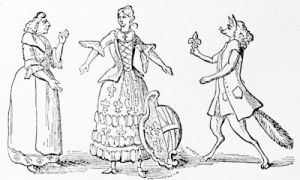
[Ed. Lord Shelburne is forced out of power, and the attention of Parliament turns to India]
Shelburne being out, the coalition found no further need for demanding material modifications in the peace preliminaries which they had first condemned. Their Treaty of Versailles, signed in September, made no changes consequence. The next question of the hour therefore was that of the government of India; and this during the last twenty years had come to be complicated by the presence in England of increasing numbers of the "Nabobs" - men who had amassed great wealth in India, especially under the conditions prevailing before Lord North's Regulating Act.
They were courted by the politicians; they were often large shareholders in the East India Company; they liked to feel themselves to be persons of importance and of influence; and they regarded patronage in India as to a great extent a perquisite of their own. The course of events in India had been very little understood by the public at large, and even those- who, like Edmund Burke, had interested themselves in it honestly and deeply, had been led astray as to the actual facts by the misrepresentations of Francis and his friends.
The House of Commons and the court of directors were both strongly biased against Hastings, who was preposterously blamed for not having prevented the blunders of the Madras and Bombay governments; and the Governor-General would have been recalled at an earlier date, but for the persistent confidence in him of the court of proprietors with which lay the final control of the new appointments under the Regulating Act.
The India Bill
Fox, then, introduced a bill for the better government of India. The political direction from London was to be withdrawn from the courts of directors and proprietors, and vested in a body of seven commissioners appointed by parliament for four years.
Absolute control of policy and patronage was to be in the hands of the commissioners; vacancies in their number were to be filled by nominees of the Crown. A second body of commissioners, chosen by parliament from among the proprietors, was to control commerce, the vacancies among its nine members being filled by the court of proprietors.
The scheme at once aroused the hostility of the whole commercial comÂmunity as being an abrogation of the East Indian Company's charter, and destructive of the position of all chartered companies. Politically it was resented as placing the whole of the Indian patronage virtually in the hands of the present majority in the House of Commons, who would thereby be enabled to secure the solid support of the nabobs at home, and therewith, as it was argued, a control of the electorate which would secure that majority permanently in power.
The king saw in the bill the death-blow of the royal authority; the Opposition saw in it the deathÂblow of electoral liberty and the mercantile community felt that their interests as a body were jeopardised by the violation of the East India Company's charter.
Royal Interference
But the coalition had an overwhelming preponderance in the House of Commons. The bill was carried in that chamber by a large majority. The vote of the House of Lords was uncertain, but was decided by the action of the king, who made it known that he would treat the voting upon it as a personal matter.
This turned the scale with many of those peers who in the past had been associated with North. The peers rejected the bill. The Government carried in the Commons a vote of censure on the unconstitutional intervention of the Crown. George dismissed the ministers, and Pitt accepted appointment as First Lord of the Treasury.
Pitt the Younger comes to power
The obvious course for the dismissed ministers was to demand a dissolution. The rejection of a bill passed by a large majority in the House of Commons had been procured in the House of Lords by the king's unconstitutional interference. An appeal to the country on that issue would have given them an almost irresistible case, and the appeal could hardly have been refused. But they did not want a dissolution.
They imagined that they could force the young minister to resign, and George to recall them to office, without risking an election which might weaken their preponderance because of the unpopularity of the India Bill. Thus they delivered themselves into Pitt's hands. Practically single-handed he fought from day to day in the House of Commons against the most famous orators and debaters of the time, and day by day the tide of his popularity rose in the country.
The Opposition had dropped the constitutional issue which was their most valuable asset, and had made Pitt a present a new one by claiming the right to force themselves upon the king, to dictate to him the choice of ministers, without an appeal to the country. And day by day the India Bill became more and more unpopular. At last Pitt felt that his moment had come; Parliament was dissolved in March, a mere remnant of the coalition were able to retain their seats, and Pitt came back to parliament with a record majority at his back.
This article is excerpted from the book, 'A History of the British Nation', by AD Innes, published in 1912 by TC & EC Jack, London. I picked up this delightful tome at a second-hand bookstore in Calgary, Canada, some years ago. Since it is now more than 70 years since Mr Innes's death in 1938, we are able to share the complete text of this book with Britain Express readers. Some of the author's views may be controversial by modern standards, particularly his attitudes towards other cultures and races, but it is worth reading as a period piece of British attitudes at the time of writing.
History
Prehistory - Roman
Britain - Dark Ages - Medieval
Britain - The Tudor Era - The
Stuarts - Georgian Britain - The Victorian Age

